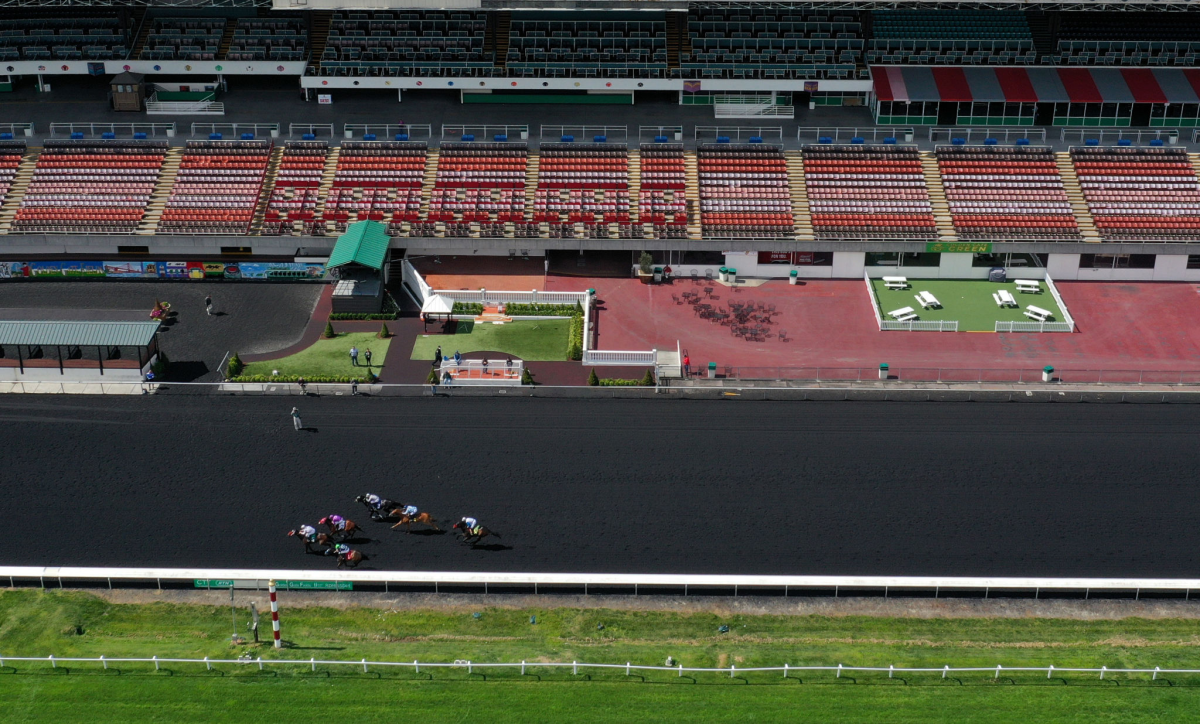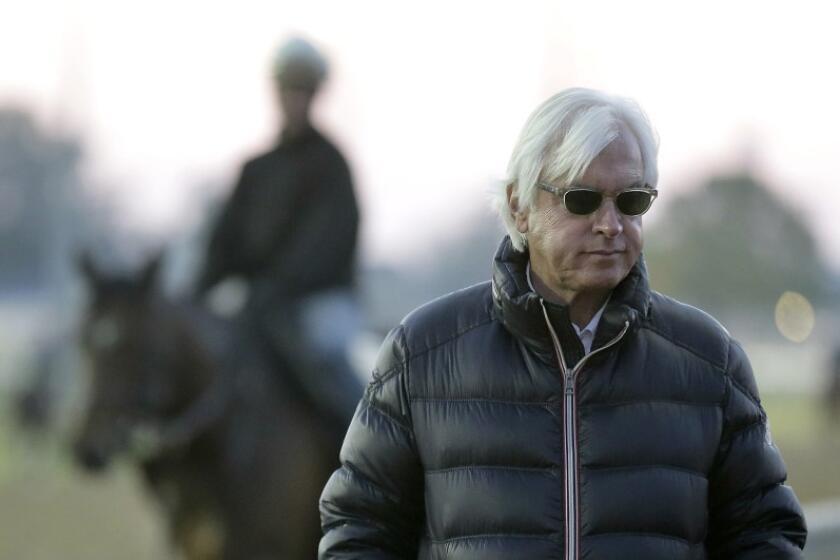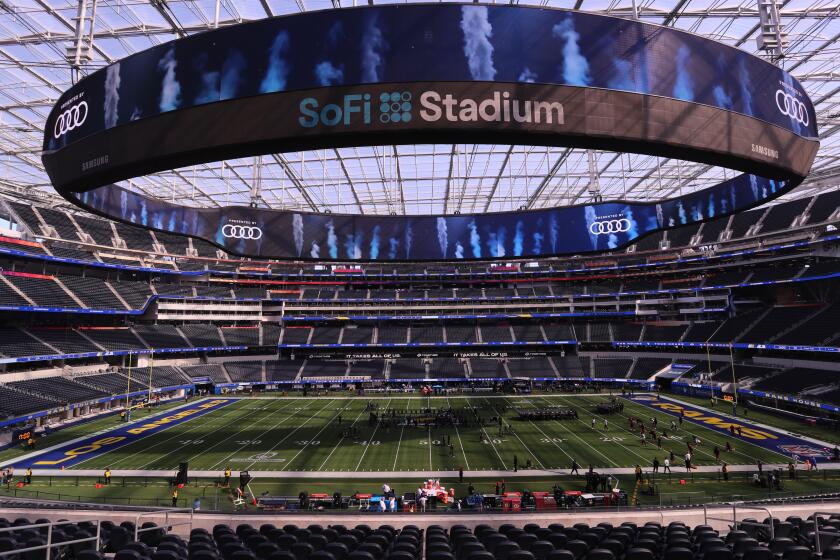Stronach Group to shut down Golden Gate Fields to help prop up Santa Anita racing

- Share via
In a major move that will change California horse racing, The Stronach Group announced Sunday that it will cease racing at Golden Gate Fields in the Bay Area at the end of its meeting on Dec. 19.
The move is being made to help prop up racing at Santa Anita by increasing field sizes and the possibility of adding a fourth day of racing back to the Arcadia track.
It’s unclear what will happen to the land that straddles Albany and Berkeley, but one possibility is that it could become either a state park or an open green space. Other possibilities have not been ruled out.
The ban of legendary horse racing trainer Bob Baffert by Churchill Downs Inc. was extended another 1½ years, but why? The Times examines the case.
“We believe that the future success of racing depends on a business model that encourages investment in Southern California, one of North America’s premier racing circuits,” said Belinda Stronach, chief executive and president of The Stronach Group.
“Focusing on Santa Anita Park and San Luis Rey Downs as a state-of-the-art racing and training facilities that offer enhanced program quality, increased race days, expanded wagering opportunities, and premier hospitality and entertainment experiences is vital to ensuring that California racing can continue to compete and thrive on a national level.”
Stronach conceded it will be a hardship for many in Northern California, including some employees who have worked at the track for almost half a century.
“The Stronach Group is committed to honoring labor obligations and developing a meaningful transition plan.” Stronach said.
The move was not met with universal praise, especially from the California Thoroughbred Trainers.
“[Sunday], we learned with great dismay, fear, and anxiety, on behalf of all California trainers and their thousands of employees, of the Stronach racing company’s decision to discontinue racing at Golden Gate Fields later this year,” said Alan F. Balch, executive director of the CTT. “We can only say that we would have hoped those responsible for such a decision had taken their own contractual obligation for fairness, inclusion, communication and honesty as seriously as we have.
“The ramifications of this Stronach decision will be far-reaching and long-lasting. They will include, we believe, a great many unintended and mainly detrimental consequences for all of racing and thoroughbred breeding throughout California and the West, including in Southern California. We can only hope that we are entirely wrong.”

The Thoroughbred Owners of California did not know about the decision until Sunday afternoon.
“This announcement may be sudden but it is not totally unexpected,” said Bill Nader, TOC president and chief executive. “Production costs and purse generation in California do not have the benefit of a second source of income like other competing states, leaving little margin for error.
“The Golden Gate Fields business model has been in a fragile state for years with warnings from 1/st Racing that it does not work in its current state. The news of the closing of Golden Gate Fields is an unfortunate loss to many people that call it home as well as racing fans across the country. We will work together with our industry partners to find the right path forward to growing horse racing in California, and preserving its positive impact on jobs, the economy, and the state breeding industry.”
It’s another blow to the sports landscape of Northern California. Oakland lost the Raiders to Las Vegas, and baseball’s A’s are right behind them in relocating to the desert. Northern California has had horse racing since 1934 when Bay Meadows opened. The track closed in 2008. Golden Gate Fields opened in 1941 and has meets scheduled for Aug. 23-Oct. 3 and Oct. 18-Dec. 19.
While it may seem logical that a lot of the Golden Gate horses will move south, the California fair circuit, which includes Ferndale, Fresno, Pleasanton, Sacramento and Santa Rosa, will be making a strong pitch to keep the horses in the north.
“Five years ago [when it was rumored Golden Gate was going to be sold], we put together a 12-month calendar that will make Sacramento its 12-month base,” said Larry Swartzlander, executive director of the California Authority of Racing Fairs. “We probably wouldn’t race in January and February and just shut down after the holidays but will race the rest of the year.”
Swartzlander added that Sacramento has about 1,100 stalls and he believes that Golden Gate had about 1,000 horses.
Sunday’s CONCACAF Gold Cup championship showdown between Mexico and Panama is SoFi Stadium’s opportunity to impress FIFA and land the 2026 World Cup final.
Of the fair stops, only Santa Rosa has a turf course, but Swartzlander says one is being added to Sacramento.
One obstacle for Santa Anita is that not all horses at Golden Gate are of the current quality to run at the signature track. Racing would require writing races for cheaper-priced horses. And running in Southern California is a more expensive proposition for trainers and owners who are operating on a shoestring budget.
“Horse racing has its farm system, and you can’t have big tracks running without farm systems,” Swartzlander said. “So not all horses can end up running at the same tracks.”
Golden Gate has come under scrutiny from animal rights activists lately, although it’s not likely that it played a role in this decision. Earlier this month, the Berkeley City Council proposed an ordinance that would guide the maximum number of hours a horse could be in a stall and mandate a minimum amount of pasture space. The ordinance was aimed squarely at horse racing and excluded horse rescue and adoption organizations.
More to Read
Go beyond the scoreboard
Get the latest on L.A.'s teams in the daily Sports Report newsletter.
You may occasionally receive promotional content from the Los Angeles Times.













